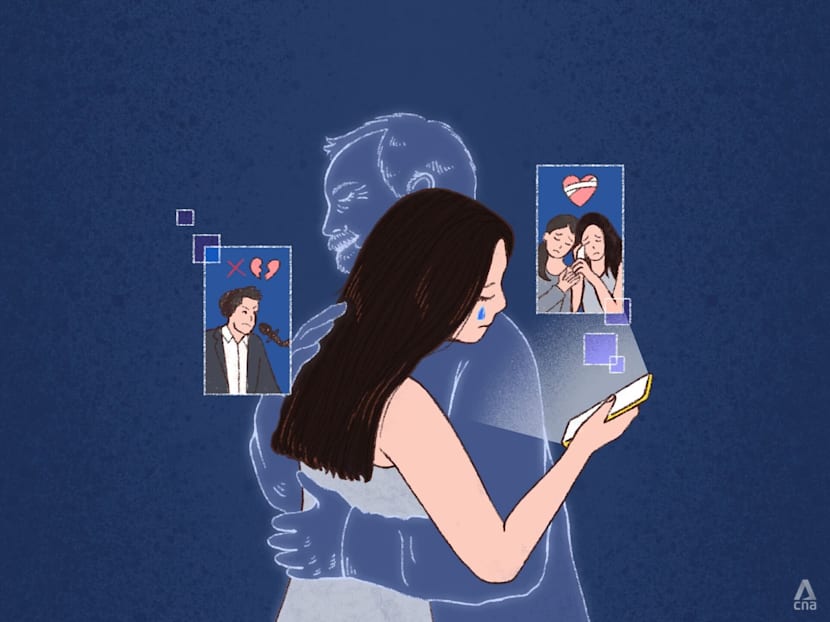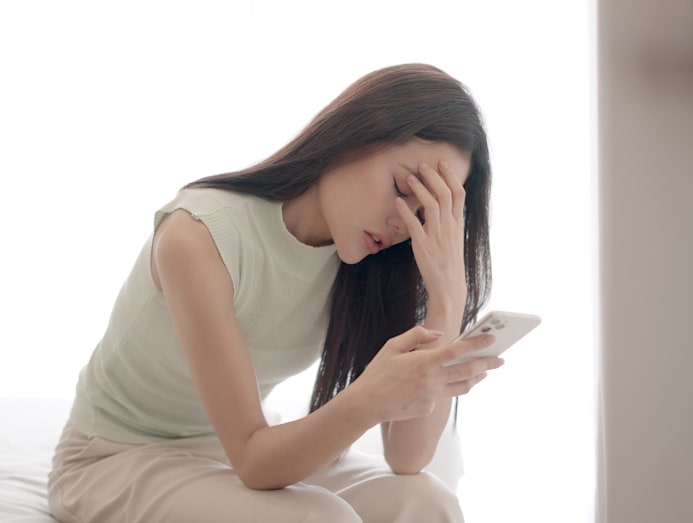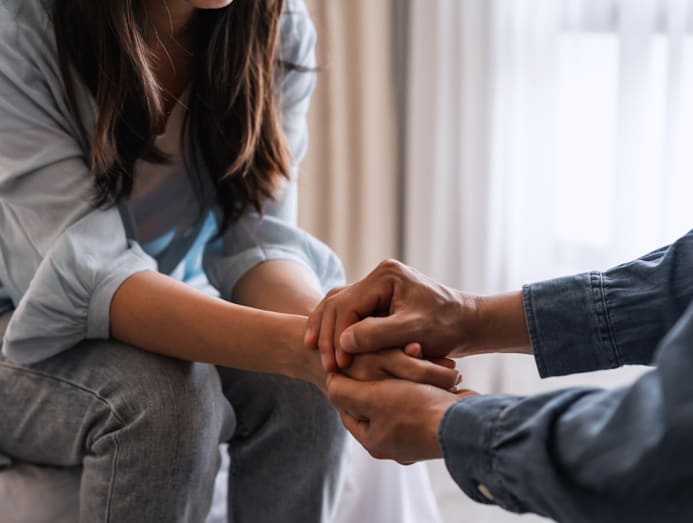In the depths of my grief, I turned to social media for comfort. It only made me feel worse
When her grandfather died unexpectedly, CNA TODAY's Loraine Lee sought advice and comfort in familiar places: Instagram and TikTok. It taught her that some things can't be solved by scrolling.

When CNA TODAY's Loraine Lee lost her grandfather unexpectedly, she sought comfort in what she knew: social media. However, rather than being a balm for her wounds, it only rubbed salt in them. (Illustration:CNA/Nurjannah Suhaimi)

This audio is generated by an AI tool.
I had turned on the air conditioner, used my calming essential oils and flipped my pillow thrice. Despite my exhaustion from being up all night, all my usual bedtime hacks and tricks did little to help me fall asleep.
Just hours earlier, I'd received news: My grandfather had died.
Grief kept me up long enough on that September night to see the sun rise from my bedroom window, chewing on my emotions and sensibility. As the wakeful hours dragged on, I felt like I needed to do something – to distract me, direct me, or just be there for me.
So, I turned to social media.
At this point, I was three weeks into a month-long social media ban aimed at curbing an addiction to scrolling endlessly online.
According to my phone's built-in tracker, before my self-imposed ban, I was spending 25 hours each week on my phone on social media apps.
Admittedly, some of this was work-related. Much of it was also due to my habit of leaving YouTube videos playing endlessly as I slept or worked.
Nevertheless, it was horrifying to realise that I was spending the equivalent of one in every seven days on social media – nearly 15 per cent of my life.
Perhaps it's no surprise that despite my ban, social media was the first place I turned in search of consolation that night (or rather, morning).
But while I fell back on my social media dependency seeking comfort, it quickly proved to rub salt in my wounds, rather than the balm I had expected.
THE DIFFICULTY TALKING ABOUT DEATH
My grandfather's death was not a sudden one. At 80 years old, he had been ill for some time. Two weeks prior, he had been hospitalised for a heart attack.
Even so, there had been no doubt in my mind that he would make it out of the hospital alive.
Up until the day before his passing, his doctors had still been talking about scheduling surgery for him. That same day, my grandfather told me that he wanted to go eat mutton soup in Chinatown.
Everyone knows death is an immutable part of the cycle of life, but nobody really teaches you how to handle the grief that comes when a loved one dies. We can try to prepare for the inevitable, but the truth is that no amount of preparation can really lessen the pain.
In the days following my grandfather's passing, I felt smothered in a state of constant exhaustion.

The most mundane parts of my usual daily routine became an impossibly heavy burden – getting out of bed, pouring myself a glass of water, even eating a few bites of food.
I found it difficult to talk to anyone about the sadness that consumed me, even those nearest and dearest to me. I thought of opening up to my family about my emotions, but the sight of dark circles around their red-rimmed eyes and tear-soaked tissues piling up in the funeral's dustbin kept me silent.
I felt like I would only burden them if I sought comfort from them. Besides, I reasoned, I had no energy to talk about my emotions.
24/7 COUNSELLOR
I had no energy to text friends one by one with the news. So, in the midst of my social media hiatus, I opened Instagram to inform my close friends of my grandfather's wake.
Many attended the funeral; many more reached out with supportive, concerned messages. I welcomed their presence, physical or otherwise – but I struggled to unload my sadness onto them. I didn't want to disturb them any more than I already had. I couldn't find the words to express my emotions anyways.
With the social media dam broken, I found myself relying instead on the online content of strangers as I searched for an explanation of my emotions and why I felt so upset.
Videos of people talking to the camera felt especially comforting – for a brief time, it seemed to be almost as good as talking to a real friend.
The sense of validation pulled me further and further down the virtual rabbit hole. The more grief content I found on Instagram and TikTok, the more I began trusting it wholeheartedly – despite knowing full well the dangers of buying into anything I see on social media without question.
But with sorrow clouding my judgment, I gave myself over to these short clips set to motivational music, anchored with the calm but authoritative tone of voice so favoured by content creators of this sort. They were fluent in "therapy speak", peppering their monologues with phrases such as "it's normal to feel sad" and using analogies such as dance rhythms and waves – whatever that means.
It was how they said it, so sympathetic and sure of themselves, that made me fall for their advice.
Unfortunately, sometimes they said terrible things – advice no one in the throes of grief should follow.
One video in particular urged me to "restart the rhythm of life, no matter how tough it may feel". Once I got my "rhythm" again, things would naturally fall into place, said a man dressed in a suit. His Instagram bio was decorated with a long list of titles: "keynote speaker", "consultant", "life coach".
So I pressed on despite my emotions and focused on handling family affairs, including sorting through my grandfather's belongings. A week after his cremation, I jumped right back into work, still in my grief-stricken state.
Within a month, I wound up with three counselling sessions and a new ailment: burnout.
REDUCING RELIANCE ON SOCIAL MEDIA
Now I realise that "ignore your emotions and just get on with life" is indeed terrible advice.
But I was too deep in despair and distraction to realise it in the moment. Instead of tending to myself with care, I was on a never-ending chase for the short-lived highs of social media. I was even thankful for how the platforms' algorithms, designed for prolonging engagement, kept me mindlessly scrolling and distracted me from the pain I was facing.
But over time, I started realising that social media wasn't making me better. In fact, it was making me worse.
The cold, calculating algorithms I had previously been so grateful for now kept recommending me videos and posts on grief and death – a constant reminder of what I was going through.
I also realised that every time I turned to social media platforms to distract me, I wound up getting emotional whiplash once I put my phone down. Almost right away, the bad, sad feelings would flood back in, even more intensely than before.
FEELING CONNECTED VS BEING CONNECTED
As I slowly broke free of my social media dependency, I also realised that years of using it as my primary tool to stay connected with the people in my life has, ironically, made me lonelier than ever.
I have lost count of the number of friends I felt like I couldn't reach out to in my time of need, all because I had barely held a proper conversation with them in years beyond reactions to their social media posts and superficial exchanges about the latest trend or viral meme.
Right now, what's helping me is returning to real support from people around me – the kind you can't get in 30-second bite-sized video clips.
I'm reconnecting with my friends, picking up my phone not to "like" their social media posts but to send a text suggesting dinner or to ask about their day. I'm learning to open up about my emotions – both to mental health professionals, but also to my loved ones.

These people understand the context – they know my personality and circumstances. They're able to lend me a listening ear, a shoulder to cry on and sound advice meant for me, not to appeal to the broadest possible audience online.
I'm not cutting out social media entirely from my life as it does still help me stay connected with those in my social circle, but experiencing it as such a big part of my grieving process has set me on the path to re-evaluating my relationship with it.
Sure, it was easier to type in a search bar than to talk to a real person. And it felt more relatable and comforting watching a video of someone speaking about grief rather than reading about it on a cold, impersonal website.
However, while social media can make us feel seen and heard immediately, this instant gratification is often its only reward – a reward that may end up costing us more than it's worth.
Loraine Lee is a journalist at CNA TODAY.
If you have an experience to share or know someone who wishes to contribute to this series, write to voices [at] mediacorp.com.sg with your full name, address and phone number.












